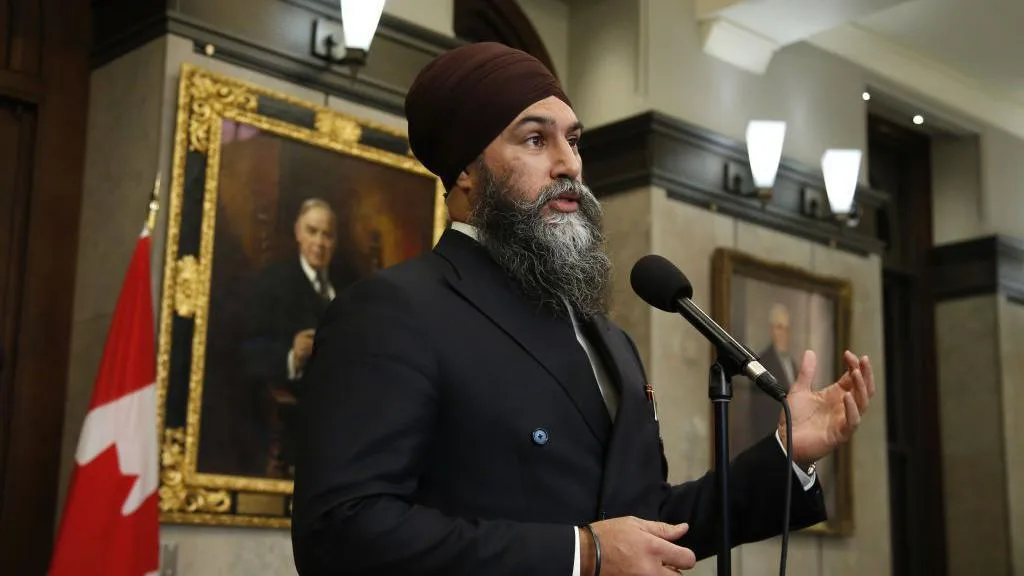Canada’s NDP: Canada’s political landscape is undergoing a seismic shift, as the New Democratic Party (NDP) has decided to withdraw its support from Prime Minister Justin Trudeau’s Liberal government. This decision could have significant repercussions for Canada’s governance and its political future. With both parties having cooperated in recent years, the sudden withdrawal signals potential instability in Trudeau’s minority government.

Why the NDP Pulled Support
The NDP’s decision to pull its support stems from increasing dissatisfaction with the Liberal Party’s handling of key issues. According to NDP leader Jagmeet Singh, the government has failed to deliver on promises that matter most to Canadians, including healthcare, affordable housing, and climate action. Singh expressed frustration over what he called “empty promises” from the Liberals, highlighting that many of the policies agreed upon when the NDP originally backed Trudeau have seen little to no progress.
Singh and his party are concerned that continued support for the Liberals will hurt their own credibility with voters, particularly as the NDP positions itself as the party of working-class Canadians. By withdrawing support, Singh hopes to pressure Trudeau’s government into adopting more decisive and effective policies in line with the NDP’s values.
The Impact on Trudeau’s Government
Trudeau’s Liberal Party currently holds a minority government, which means they do not have enough seats in Parliament to pass legislation without the support of other parties. Since the 2019 election, the NDP has been one of the Liberals’ key partners, often siding with them on crucial votes to keep the government running smoothly. The loss of the NDP’s backing now puts Trudeau’s ability to govern in jeopardy, increasing the risk of a snap election or a vote of no confidence in Parliament.
Without the NDP’s support, Trudeau will need to either find new political allies or make concessions to win back the NDP’s favor. Alternatively, he could seek support from other opposition parties, such as the Bloc Québécois or the Conservative Party, though both are less ideologically aligned with the Liberals.
Potential Outcomes
The withdrawal of NDP support could lead to several possible outcomes, each with its own set of implications for the future of Canadian politics.
1. Snap Election
One of the most immediate risks is the possibility of a snap election. Without the NDP’s backing, Trudeau could be forced to call an election to solidify his party’s position or risk losing a confidence vote in Parliament. An election at this point could be a gamble, as the Liberals’ popularity has waned in recent months due to dissatisfaction over the handling of several key issues, including inflation, housing, and climate change.
2. New Alliances
Trudeau may seek to build new alliances with other political parties to keep his government afloat. The most likely candidate is the Bloc Québécois, a party that champions Quebec sovereignty but has supported the Liberals on occasion when it aligns with Quebec’s interests. However, this alliance would likely require concessions that could alienate voters outside of Quebec, particularly in Western Canada, where the Liberals already face significant opposition.
3. NDP’s Agenda
If Trudeau wants to maintain NDP support, he may be forced to adopt more of their progressive agenda. This could mean stronger action on affordable housing, healthcare reform, and climate policy. Singh has made it clear that his party will not support the Liberals unless they commit to real change on these issues. However, adopting the NDP’s platform could further divide the Liberal Party’s voter base, particularly among centrist and fiscally conservative voters.
The Broader Political Implications
This development comes at a time of political uncertainty in Canada. Trudeau’s popularity has been declining, with many Canadians frustrated by the government’s handling of economic issues such as inflation and housing affordability. The NDP, meanwhile, is positioning itself as the champion of progressive policies and could gain new support as it distances itself from the Liberals.
Moreover, the Conservative Party under leader Pierre Poilievre has been gaining momentum, particularly among voters frustrated with the status quo. If Trudeau is forced into an election, the Conservatives could capitalize on the Liberal-NDP split to win more seats in Parliament, potentially even forming a new government.
Public Reactions and Voter Sentiment
Public opinion on this development is mixed. Many NDP supporters have expressed relief that their party is no longer tied to a government they see as ineffective. On social media, NDP voters have voiced their approval, calling the decision a long-overdue move that will hold the Liberals accountable for their inaction on key issues.
However, Liberal supporters are concerned about the potential fallout. Some worry that the withdrawal of NDP support could pave the way for a Conservative victory, which could roll back progress on issues like climate change and social justice. The upcoming months will be critical as both parties attempt to rally public support in a rapidly shifting political landscape.
What Lies Ahead for Canadian Politics
The NDP’s decision to pull support from Trudeau’s Liberals has created a political crossroads for Canada. The future is uncertain, and much will depend on how the Liberals respond to this new reality. Will Trudeau be able to forge new alliances or implement policies that win back the NDP’s backing? Or is Canada heading toward an election that could see a significant realignment of political power?
As the situation unfolds, one thing is clear: the NDP’s decision marks a turning point in Canadian politics, one that could have lasting consequences for both the Trudeau government and the country as a whole.
For more insights and updates on this developing story, visit Digital Digest.






